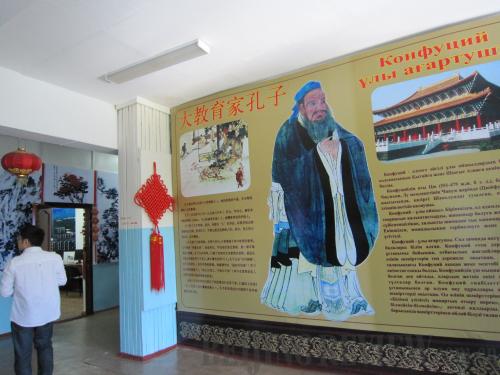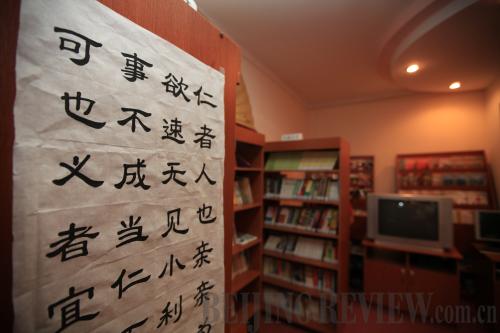|
 |
|
CHINESE STYLE: A wall of the Confucius Institute in Almatty, Kazakhstan, with the image of Confucius (ZHANG ZHIPING) |
"I want to go to China to attend a university in Beijing," said 16-year-old Ruslan, speaking of his own future. He has been studying for four years at the Confucius Institute, a school teaching foreigners Chinese language and culture, in Tashkent, capital of Uzbekistan.
More than 2,000 years ago, the Silk Road opened by Western Han Dynasty (202 B.C.-
A.D. 8) envoy Zhang Qian, passed through Central Asia, which has been closely linked by the trade route with China.
Presently, as contacts grow closer, Uzbekistan, Kazakhstan and other countries in Central Asia are receiving growing intakes of government-sponsored Chinese language teachers, and courses in Chinese language are being offered in many universities. In addition, since China adopted its reform and opening-up policy more than 30 years ago, its achievements in economic development have captured world attention. As a result, both Chinese culture and language are enjoying an increasing popularity among local people.
 |
|
LEARNING CHINESE ART: A calligraphic work by a student at a Confucius Institute in Uzbekistan CHINESE STYLE: A wall of the Confucius Institute in Almaty, Kazakhstan, with the image of Confucius (YANG JIA) | Mentioning China's big cities such as Beijing, Shanghai, Guangzhou and Xi'an, Ruslan and his classmates rattled on as if talking about their families.
After graduating from the Confucius Institute, many students choose to go to China for advanced studies, while others find work in local Chinese enterprises. The institute has not only taught the students Chinese language and culture, but also created a wider range of employment opportunities for them.
A School in Tashkent
During Chinese President Hu Jintao's visit to Uzbekistan in June 2004, China and Uzbekistan signed an agreement to collaboratively build a Confucius Institute in the Central Asian country. In May 2005, the institute was formally opened in Tashkent.
|
